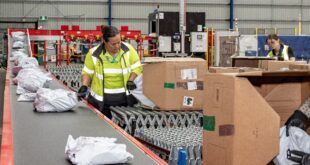Percy and Penny will be working all hours this month and next, but they will not be earning overtime.
Each of the two “autobagging” machines at Marks and Spencer’s Donington distribution centre — named after the retailer’s trademark pig sweets — allows staff to pack 1,000 items an hour; three times as many as they would without the technology.
They are just one part of a mammoth effort to ensure M&S can meet demand at its busiest time of year, even though many of its stores in England will be wholly or partially closed for the next three weeks.
M&S has raised its online capacity by 45 per cent compared with last year, hiring another 1,000 staff and improving IT processes, and plans further increases in the coming weeks.
Overall, UK retailers have spent millions of pounds expanding their ability to sell online and adapting warehouses to comply with social-distancing rules since the pandemic began in spring. They now face their biggest test.
Last year, UK non-food retail sales were £23.3bn in the festive month between Black Friday at the end of November and Christmas, almost twice the amount in most other months of the year.
Andrew Murphy, operations director at John Lewis Partnership, said that at the group’s department stores, volumes from November to Christmas were typically three to four times those of the first quarter.
The industry is entering that most crucial period with all non-essential stores closed and shoppers being told to stay at home.
Retailers are generally confident they can meet the inevitable higher demand for online purchases — although Mr Murphy predicted that the “virtual queue”, which restricts the number of users on a retailer’s website at any one time to maintain service, was likely to make a reappearance.
Steve Rowe, M&S chief executive, said the company was “set up to deal with” higher online sales and organisationally “in a different place” to the first lockdown.
But the industry relies on an army of delivery and warehouse workers to fulfil orders. Frank Proud, director of consultancy Apex Insight, said constraints may emerge at the distribution hubs through which orders are routed before being dispatched for “last mile” delivery.
“Given many [parcel carriers] were already running at a peak level, to have another peak on top of that is probably going to be a stretch,” he said. “It’s hard to see there not being a bit of pressure on the system given that the high street is going to be closed.”
Bruce Fair, chief revenue officer at Metapack, whose software links distribution hubs with delivery companies, said software and systems were highly scalable and could cope. “The challenge will be if the carriers run out of vans and drivers.”
Carriers said they had prepared. The largest, Royal Mail, is seeking 33,000 seasonal workers in its largest ever Christmas recruitment drive — an increase of at least 40 per cent on historical levels.
Home delivery of parcels is quicker because low-contact procedures implemented in response to Covid-19 have removed the need for customer signatures.
In a change of policy from the first lockdown, non-essential shops in England will be able to offer click-and-collect services; John Lewis expects to deliver 2.5m packages this way during the peak period. Many branches of Next and M&S are also offering the service, although JD Sports, New Look, Topshop, Sports Direct and Debenhams have opted to close stores completely.
Debenhams, which before Covid-19 generated a relatively low 20 per cent of sales online, has partnered with Hermes to allow customers to pick up parcels at more than 4,000 convenience stores — another way to ease strain on last-mile delivery.
Mr Fair expected an increase in the number of retailers shipping from stores using specialised carriers such as Paack and On The Dot. M&S said recently that 140 of its stores would be picking orders this year, up from 86 in 2019.
Retailers have several other tools available to manage demand. One is to use marketing and promotions to pull demand forward from the Black Friday peak at the end of November.
Evidence exists that consumers are shopping earlier this year to avoid the Christmas crowds. “We have definitely seen evidence of earlier buying patterns,” said John Lewis’s Mr Murphy.
This week the British Retail Consortium estimated October retail sales had grown 4.9 per cent year-on-year, having fallen in that month a year ago. But it warned that the current lockdown was costing £2bn a week in lost sales.
Christiaan Ashworth, co-founder of streetwear-focused fashion retailer End, said: “We are not expecting to promote as much as previous years because of the impact we’ve seen through our supply chain.”
Harley Finkelstein, president of Canada-based ecommerce platform, Shopify, which counts Gymshark and Hummingbird Bakery among its UK customers, said the Black Friday weekend was “becoming an entire season”.
He acknowledged “it is always better to buy earlier on” but added that supply chains were “operating at proper capacity — it doesn’t feel like we are going to see any real macro challenge”.
Reducing delivery options — for example, removing next-day or express options — is also a widely-used method of easing the strain on services at peak times.
But Frederic Court, a London-based tech investor at Felix Capital, warned of a backlash from consumers for whom Amazon’s next-day service is the benchmark. The ecommerce giant, which runs much of its own distribution, is taking on 20,000 people over the Christmas period.
Another challenge will be that once Black Friday has passed, the volume of returns will start to rise. These are inconvenient and costly for retailers to process, but Mr Fair said they caused “nowhere near as much pressure as outbound orders”.
Source link





